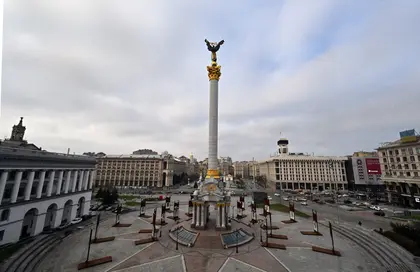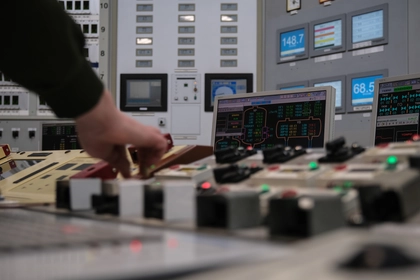“If you have sacrificed my nation to preserve the peace of the world, I will be the first to applaud you. But if not, gentlemen, God help your souls." – Czechoslovakian foreign minister Jan Masaryk to Lord Halifax, in response to announcement of allies' decision in Munich in 1938 to cede Sudetenland to Hitler.
JOIN US ON TELEGRAM
Follow our coverage of the war on the @Kyivpost_official.
2024 is a pivotal year for American and European politics, the war in Ukraine, and transatlantic security writ large. It has been off to a difficult start in Ukraine and there is an appreciation that it is bound to get only harder.
As Russia’s war against Ukraine enters its third year, missile barrages are continuing to kill Ukrainian civilians and degrade the Ukrainian grid. While the $61 billion supplemental bill for Ukraine was still stuck in the US Congress, until the House of Representatives vote finally approved it on April 20, Ukrainians have been slowly ceding territory due to the lack of munitions at the front.
It was amid this somber mood, air raid sirens, and Russian missile strikes that the 16th annual Kyiv Security Forum took place in late March in downtown Kyiv. This was the second such in-person gathering since the start of the full-scale Russian invasion.
For those, who have attended the Forum last May, the drill was familiar: 3:00 or 4:00 am air raid siren, descent into a hotel shelter, sitting out a couple of hours in silence occasionally disturbed by echoes of explosions outside–together with fellow European and American ministers, ambassadors, think tankers, and academics–hoping to grab another hour of sleep once the air alert is over and before the conference begins.

Direct Line with Vladimir Putin: Open Questions
Despite, or perhaps because, of this ever-present shadow of war, the Forum was a display of camaraderie and solidarity with Ukraine, with sincere dues paid to Ukraine’s bravery, sacrifices, and resilience, as well as in recognition that Ukraine belongs in the transatlantic security architecture. Europe whole and free is impossible without Ukraine whole and free.
In his keynote address to the conference, chair of the NATO Military Committee Admiral Rob Bauer asserted that “the Swedish flag will not be the only blue and yellow flag at the NATO headquarters.” While the audience greeted Bauer’s words with an ovation, hardly anyone was given to an illusion that Ukraine would get an invitation to join the alliance at the upcoming NATO summit in Washington, DC, this July.
Indeed, for Ukraine, the time of illusions has passed. Rather, with the US domestic politics until recently stalling aid to Ukraine, Germany demurring on the provision of Taurus missiles, and international attention to the war waning and shifting elsewhere, it has been a time of disillusionment.
The message from Ukrainian and Eastern European conference participants sounded more urgent than ever: now is not the time to waver.
Ukraine has already been losing territory to Russian advances due to the lack of artillery shells and battlefield air defenses and Ukrainian cities continue to suffer missile strikes as Western-supplied air defenses are wearing thin. Ukrainian colonel Andriy Biletsky, zooming in from a bunker on the frontlines somewhere outside of Avdiivka, recently lost to Russia, albeit at a great expenditure of Russian lives, calmly related that Russian numerical advantage on the battlefield is about 7:1. But that’s not the main problem. “We could hold our positions,” he says, “if we just had sufficient ammunition.”
Western military support for Ukraine is never taken for granted or without gratitude. Yet there is also an appreciation that Ukraine has been fighting to win the war, while the United States and other Western allies have been managing escalation.
Ukrainian military analyst Mykola Bielieskov noted that winning a war and managing escalation are different games with different rules and priorities, and these differences are now bearing bitter fruit. The military support for Ukraine has been at once generous and ad hoc, effective yet inefficient in terms of timing and insufficient in terms of quantity. Most importantly, it is aid devoid of broader long-term Western strategy for Ukraine and the region.
As a moderator for some of the panels, I got to ask my own questions. Of Estonian defense minister Hanno Pevkur, I asked why is his country so deeply committed to Ukraine’s defense, devoting half of its defense budget to military aid for Ukraine? Minister Pevkur responded that the moment Russian boots cross over Estonian border, he is confident Ukraine will be the first to come to Estonia’s defense.
Ukrainians know what a Russian onslaught is, and they have the resolve and the experience to fight it. This should give pause to NATO planners and Washington pundits who believe that fancy capabilities and lofty rhetoric about ironclad Article V commitment serves to reassure vulnerable allies. What NATO heavyweights do in Ukraine matters far more than what NATO summit declarations say.
I asked a similar question of Troels Lund Poulsen, Minister of defense of Denmark, a country which recently decided to donate all of it artillery to Ukraine. The war in Ukraine is far from Danish borders, why does Copenhagen care? And more generally, what explains the leadership of smaller European nations like the Baltic states, Poland, and Czechia, who, alongside Denmark, devote large shares of their defense budgets to Ukraine’s aid and expend effort to rally reluctant allies on Ukraine’s behalf.
For smaller nations, Minister Poulsen told me, the only paradigm of security is collective security and mutual defense. There’s no other choice: the only way to survive is to come to each other’s aid.
The only paradigm of security is collective security and mutual defense. There’s no other choice: the only way to survive is to come to each other’s aid.
In the days and weeks that followed the Forum, Russia unleashed a bombing campaign against the Ukrainian power grid, specifically targeting coal, gas, and hydro power plants and destroying some 80% of their generating capacity, according to Ukraine’s Ministry of energy. Between trips to Kharkiv and Dnipro, where large power plants have been entirely demolished by Russian strikes, the CEO of Ukrenergo, Ukraine’s grid operator, Volodymyr Kudrytskyi still generously found the time to meet with me to talk about the energy dimension of this war.
In the battle for the Ukrainian grid, Ukrenergo, its dispatchers and repair crews, have been performing nothing short of miracles to keep the lights on in Ukraine and are determined to continue doing so. At the end of the meeting, Kudrytsky voiced a request: “Could you please tell leaders in the West to stop provoking Putin. With weakness.”
This article was originally posted by the Wilson Center on April 29. The original can be seen here.
The views expressed in this opinion article are the author’s and not necessarily those of Kyiv Post.
You can also highlight the text and press Ctrl + Enter






